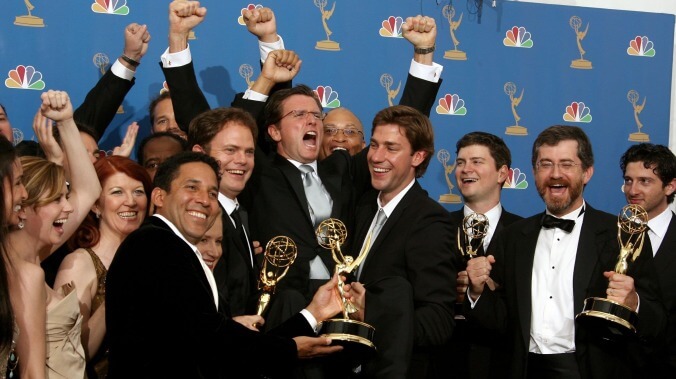The Office almost had a darker “Dinner Party” and other untold stories from a new oral history

When word emerged that Greg Daniels and NBC would be attempting an American reboot of the hit British comedy The Office, it was met with a singularly reigning sentiment: “It’ll never work.” The track record for that kind of faithful retelling hadn’t exactly been great. In fact, the network was already dealing with the disastrous results of Coupling, which lasted four whole episodes before getting yanked off the air. But what Daniels and his team recognized was an opportunity to create television that strayed from a template popularized by network juggernaut Friends—shows about sexy singles living it up in the big city. This was a chance to try something fresh, even if it was a retelling, with characters that resembled people the average viewer encountered on a daily basis. With sharp observational wit and cringe-inducing antics, The Office not only became one of the best workplace comedies, but one of the most culturally beloved sitcoms of a generation.
Writer Andy Greene puts one of the most resonant sitcoms in American comedy under a microscope in his in-depth oral history, The Office: The Untold Story Of The Greatest Sitcom Of The 2000s. Even for the most insatiable fan, this rendering provides some of the most surprising revelations via an award-winning (and still quite passionate) cast and crew. Here are a few tidbits from the over 400-page oral history, courtesy of Scranton’s finest.
1. Before The Office, there was Seedy Boss
After losing their shared radio gig at British startup radio station XFM in August of 1998, budding comedians Ricky Gervais and Stephen Merchant began working on a TV show inspired by a training course that Merchant once took at the BBC. Trading observations from their experiences in different offices, the duo formulated a demo called Seedy Boss, which featured an “early, crude version” of Gervais’ tentpole character, David Brent, and various archetypal characters. Ash Atalla, a producer on the original Office, says the demo went viral within the comedy community: “Seedy Boss was passed around in comedy circles. There was a bit of a buzz growing around it. And a few producers and directors started circling. And then we set up a meeting with Jon Plowman at the BBC to see about turning it into a series.”
2. For John Krasinski and Leslie David Baker, self-sabotage helped them land their roles
We would never recommend showing up to a job interview with a bad attitude or trashing the company to your potential boss. However, such behavior was apparently instrumental in Leslie David Baker and John Krasinski landing the parts of Stanley Hudson and Jim Halpert, respectively. On his way from another audition in Culver City, Baker’s commute was made difficult by, as he describes it, “old people driving slow, children darting in the street, locusts falling from the heavens, whatever could slow [him] down.” By the time he arrived to his Office callback, he was disheveled and grouchy. “I guarantee you that helped his audition, because he was funny and he was cantankerous and that was the character,” said casting director Allison Jones.









![Rob Reiner's son booked for murder amid homicide investigation [Updated]](https://img.pastemagazine.com/wp-content/avuploads/2025/12/15131025/MixCollage-15-Dec-2025-01-10-PM-9121.jpg)

























![HBO teases new Euphoria, Larry David, and much more in 2026 sizzle reel [Updated]](https://img.pastemagazine.com/wp-content/avuploads/2025/12/12100344/MixCollage-12-Dec-2025-09-56-AM-9137.jpg)




